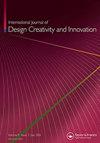基于概念分解的新颖性度量的主观性
IF 2.5
Q4 ENGINEERING, MANUFACTURING
International Journal of Design Creativity and Innovation
Pub Date : 2020-08-24
DOI:10.1080/21650349.2020.1811775
引用次数: 9
摘要
摘要Shah及其同事提出的新颖性度量是学者们提出的建议中最普遍的一个,它基于对支撑分析思想的属性和/或函数的主观识别。如果管理不当,这种主观性可能会导致评估的不可忽视的模糊性,这可能会使研究结果无效。在过去的二十年里,已经提出了该指标的几种变体,其中一些变体声称改进了原始指标。然而,相关的好处和缺点仍然不清楚,尤其是在主观性方面。本研究的目的是估计独立评估同一套想法的研究团队之间的潜在偏差。为此,通过利用三位独立评估者的评估结果,将所考虑的指标应用于一组100个想法。研究表明,由于对所分析的想法有过多不同的可能解释,所获得的新颖性得分可能会极为不同。因此,研究结果强调,对于同一组想法,评估者可以遵循非常不同的新颖性评估理由。本文章由计算机程序翻译,如有差异,请以英文原文为准。
Subjectivity of novelty metrics based on idea decomposition
ABSTRACT The novelty metric suggested by Shah and colleagues is one of the most widespread among the suggestions made by scholars, and it is based on the subjective identification of attributes and/or functions underpinning analyzed ideas. If not correctly managed, this subjectivity can lead to non-negligible ambiguity of assessments, which could potentially invalidate the research results. Several variants to this metric have been proposed in the last two decades, with some of them claiming to have improved the original metric. However, the related benefits and drawbacks are still unclear, especially in terms of subjectivity. The aim of this study is to estimate the potential misalignment between research teams that independently perform the assessment of the same set of ideas. To this purpose, the considered metrics have been applied to a set of 100 ideas by utilizing the assessment results from three independent evaluators. It was revealed that the obtained novelty scores can be extremely different owing to the plethora of different possible interpretations of the analyzed ideas. Accordingly, the results highlight that for the same set of ideas, very different novelty assessment rationales can be followed by the evaluators.
求助全文
通过发布文献求助,成功后即可免费获取论文全文。
去求助
来源期刊

International Journal of Design Creativity and Innovation
ENGINEERING, MANUFACTURING-
CiteScore
3.80
自引率
27.80%
发文量
15
期刊介绍:
The International Journal of Design Creativity and Innovation is an international publication that provides a forum for discussing the nature and potential of creativity and innovation in design from both theoretical and practical perspectives. Design creativity and innovation is truly an interdisciplinary academic research field that will interest and stimulate researchers of engineering design, industrial design, architecture, art, and similar areas. The journal aims to not only promote existing research disciplines but also pioneer a new one that lies in the intermediate area between the domains of systems engineering, information technology, computer science, social science, artificial intelligence, cognitive science, psychology, philosophy, linguistics, and related fields. The journal covers, but is not restricted to, the following topics: ·Theories on Design Creativity and Innovation ·Cognition of Design Creativity ·Innovative Process ·Inventive Process ·Analogical Reasoning for Design Creativity and Innovation ·Design Synthesis ·Method and Tools for Design Creativity and Innovation ·Representation of Design Creativity and Innovation ·Education for Design Creativity and Innovation ·Concept Generation and Inspiration.
 求助内容:
求助内容: 应助结果提醒方式:
应助结果提醒方式:


